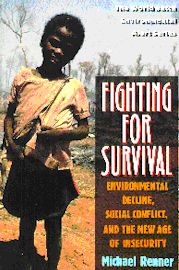 |

 |
|
|
| Compiled By GayToday
 Rapid population growth, environmental degradation, and inequitable distribution of wealth are now provoking political strife in many
countries, sometimes leading to social disintegration and armed conflict, according to Fighting for Survival: Environmental Decline, Social Conflict, and the New Age of Insecurity, a book from the Worldwatch Institute.
Rapid population growth, environmental degradation, and inequitable distribution of wealth are now provoking political strife in many
countries, sometimes leading to social disintegration and armed conflict, according to Fighting for Survival: Environmental Decline, Social Conflict, and the New Age of Insecurity, a book from the Worldwatch Institute.
"The greatest threats to security today come from within nations, not from invading armies," says Michael Renner, a Senior Researcher and author of the Worldwatch book. "These new threats are the real roots of what some have called 'the new world disorder.'" "In the struggle for environmental and social security, tanks and automatic weapons are at best irrelevant and often obstacles. Experience in Liberia and Somalia has shown that cheap arms can quickly transform social discontent into the violent disintegration of countries. More than 30 armed conflicts are currently underway--most involving antagonists within, not between, nations." As population pressures build, and local resources collapse, people often resort to ethnic, religious, or other group-based identities for protection. Among the most vulnerable are the 400 million poor people in developing countries who now eke out a meager living on ecologically fragile lands.
Some 3.6 billion hectares--about 70 percent of potentially productive drylands, or nearly a quarter of the earth's land area--have already been turned into deserts, according to Fighting for Survival. Half of all agricultural land is moderately degraded and 16 percent is strongly degraded. Such lands can no longer support a growing human population. And in Latin America, wealthy landowners control much of the best land, so as the population expands, poor peasants are forced onto marginal lands. With grain prices rising in the nineties, diminished food self-sufficiency and increased dependence on imports may leave millions of people vulnerable to malnutrition. Deforestation is also undermining human security, says the Worldwatch book. Between half and three-quarters of the middle mountain range in Nepal has been deforested in the last 40 years, and in India, 40 percent of the forests have been lost in the last 25 years. Consequently, flood-prone areas in India have nearly tripled--to almost one-fifth of its territory--causing crop damages of more than $1 billion annually. In Bangladesh, deforestation has doubled the area vulnerable to flooding-- to nearly two-thirds of the country's territory. A devastating cyclone in 1988 submerged 80 percent of Bangladesh and left 25 million people homeless. "These threats to security could be exacerbated by coming changes in the world's climate caused by the buildup of greenhouse gases. This is projected to trigger an increase in heat waves, hurricanes, floods, droughts, wildfires, and a rise in sea level that could displace 70 million people in China alone." Studies indicate that climate change could cut Egypt's corn yield by one-fifth and its wheat yield by one-third, while Mexico's rain-fed corn crop may be reduced by as much as 40 percent. India's vital wheat crop is also at risk since much of it is already at the edge of its climatic range. In Asia, almost 10 percent of the world's rice production--enough to feed more than 200 million people--is considered vulnerable to sea level rise. Beyond these environmental threats, Fighting for Survival notes that growing inequality has further reduced the security of low-income people in recent decades, and has torn at the social fabric of societies. In many countries, rural peasants and the urban poor saw their incomes decline in the eighties, and then failed to benefit from the surge in economic growth in the nineties. Out of a global labor force of about 2.8 billion people, at least 120 million are unemployed, while 700 million are classified as "underemployed"--receiving too little income to cover even the most basic needs. "In several countries, such problems have led to internal conflict," Renner notes. In the Mexican state of Chiapas, land scarcity in the last decade has pushed growing numbers of peasants into the region's Lacandon rainforest, provoking competition with ranchers and loggers--who already control the most productive land. Tree cover in the Lacandon declined from 90 percent in 1960 to 30 percent today, while soil fertility was simultaneously exhausted. As the local economic situation deteriorated, Renner reports, Zapatista rebels--a force largely made up of indigenous peasants--staged an armed uprising in January 1994 to protest the government's decision to abandon a historic commitment to land reform. This led in turn to violent clashes with the Mexican army, and political instability that continues today. Beyond such internal conflicts, environmental and social problems are creating tensions between countries, according to Fighting for Survival. The flow of refugees from Mexico to the United States, and from North Africa to Europe, has led to political confrontation. The dramatic depletion of several oceanic fisheries in the past decade has also created tensions--and in some cases armed confrontations--between fishing nations.
 Conflicting claims on the Euphrates River have spawned similar tensions among Turkey, Syria, and Iraq. Ethiopia's plans to expand its diversion of the upper Nile river in Africa for irrigation and hydropower could bring that country into conflict with Egypt, for whom the Nile is literally a lifeline.
Conflicting claims on the Euphrates River have spawned similar tensions among Turkey, Syria, and Iraq. Ethiopia's plans to expand its diversion of the upper Nile river in Africa for irrigation and hydropower could bring that country into conflict with Egypt, for whom the Nile is literally a lifeline.
Renner finds that many nations are now locked into a zero-sum game over a diminishing resource. To prevent these disputes from leading to armed conflict will require careful diplomatic attention, as well as accelerated efforts to deal with the underlying environmental and social roots of this new insecurity. The book sketches the shape of a new balance in security investments, one that de-emphasizes military armament, and meets urgent environmental and social investment needs of roughly $200 billion per year. Part of this funding can be obtained by cutting today's $800 billion global military budget, rechanneling foreign aid, and providing speedy debt relief. Additional funds will have to come from private sources--spurred in part by tax incentives and other fiscal policies. Among the elements of a new security policy recommended in the final chapter of Fighting for Survival: Expanded efforts to slow population growth by increasing support for women's education, health, and family planning. Programs to sustainably manage and use forests, water, and soils--the resources that underpin most rural economies. Redistribution of land. In Brazil, where 5 percent of landowners control at least 70 percent of all arable land, redistributing idled land would provide enough acreage for 12 million landless and near-landless. Greater credit for the urban and rural poor who are generally denied loans by commercial banks. Increasing the number of people who receive micro-loans would generate jobs and income that reduce social tensions and the need to migrate. More expeditious debt relief, particularly for the poorest countries that owe an unmanageable $200 billion. Efforts by debtor nations to service their foreign loans have hemorrhaged their economies, strained the social fabric, and led to environmentally disastrous logging and mining projects. Strengthened global conventions on climate and biodiversity. Unless the climate is stabilized and natural ecosystems protected, other efforts to improve human security may be overwhelmed. Expanded funding for the sustainable development programs carried out by the United Nations Development Programme, the United Nations Environment Programme, the United Nations Fund for Population Activities, and the Global Environment Facility. All four have been hit hard by recent budget cuts. "Security in the nineties has less to do with how many tanks or soldiers a country can field," Renner concludes, "and more with how well it protects its arable lands and watersheds, and whether it is able to reduce social pressures. National leaders would do well to focus less on the symptoms of today's conflicts and more on their root causes, less on the dangers from abroad and more on the perils within." |

© 1997-99 BEI